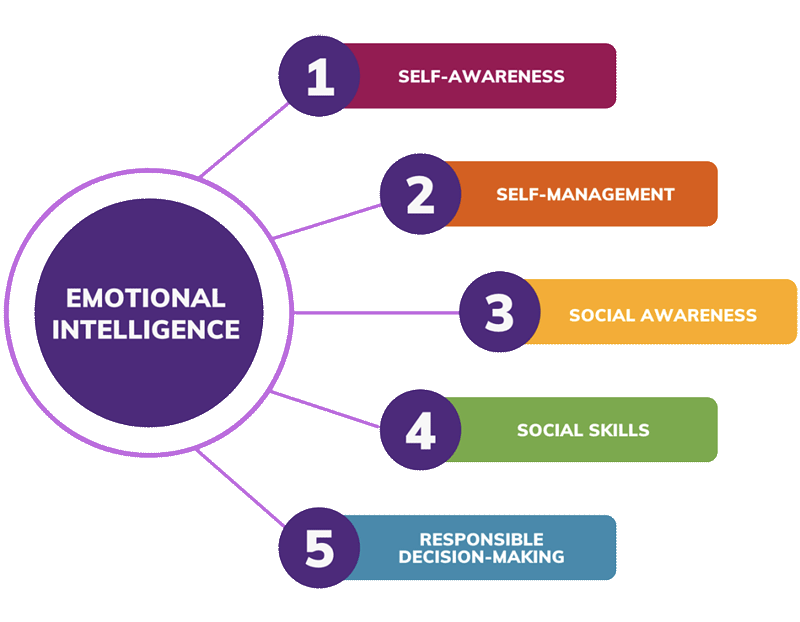Emotional Intelligence
What is Emotional Intelligence?
Emotional Intelligence (EI): The ability to manage one’s feelings and emotions and react positively with other people.
“Emotional intelligence is a way of recognizing, understanding, and choosing how we think, feel, and act. It shapes our interactions with others and our understanding of ourselves. It defines how and what we learn; it allows us to set priorities; it determines the majority of our daily actions. Research suggests it is responsible for as much as 80 percent of the “success” in our lives.”
-Joshua Freedman
Importance and Benefits of EI
The importance of building emotional intelligence (EI) is imperative to a military child’s future academic, social and career successes. When youth are intentionally provided opportunities to build their emotional intelligence (EI) skills, they become more knowledgeable, responsible, reflective, empathetic, and considerate life-long contributors of their communities.
Learning how to identify and express one’s emotions builds character and resilience essential for future academic, life, and future career success. A high EI is associated with a positive sense of self and one who intentionally practices self-care routines necessary to build social and emotional awareness. Students who learn how to manage their feelings and emotions are likely to communicate clearly and assertively, resolve conflicts creatively, handle stress, and act with integrity in all areas of their lives (Elias and Tobias, 2018).
Components of Emotional Intelligence:
The CASEL 5 areas of concentration are interrelated emotional intelligence competencies to include:
- Self-Awareness
- Self-Management
- Social Awareness
- Social Skills
- Responsible Decision-making.
These emotional intelligence competencies can be taught and applied throughout the human lifespan, developmental stages, and across diverse cultural contexts. High emotional intelligence is tied to a positive sense of self and one’s ability to experience meaningful relationships, academic success, school and civic involvement, strong familial relationships, overall health and well-being all leading to fulfilling futures and careers (Drigas & Papoutsi, 2018)

Emotional Intelligence Apps and Games
This collection of top-notch apps and games will help students with everything from anger management to emotion identification to meditation.Social and Emotional Learning Kit for Parent Champions
Leading with SEL represents key voices in education who share a vision for a high-quality education that includes social and…The Field Guide to the Military Teen
A guide to military teens by military teens for communities with military teens.Social-Emotional Development: Family Resources
Social-emotional skills play an important role in the lives of parents, caregivers, and children.Emotional Health Toolkit
You’ll find a wide array of free EQ resources for supporting emotional intelligence and social-emotional learning in your home, schools,…Emotional ABCs
Teach your child how to manage emotions and make good choices even during emotionally challenging situations.The Family Dinner Project
An online community designed to help you improve your family dinners and meet your mealtime goals.Breathe, Think, Do with Sesame
Try teaching kids this three-step strategy to teach problem-solving, self-control, planning, and persistence. It works for grown-ups, too!
Integrated Learning, Integrated Lives
Highlighting Opportunities for Transformative SEL Within Academic Instruction
District Resource Center – Casel
Created for leaders and educators in any district, the DRC offers research-based guidance and curated resources to help organize, implement,…
Fundamentals of SEL
SEL can help people thrive personally and academically, develop and maintain positive relationships, become lifelong learners, and contribute to a…Student Mental Health and Well-being
A review of evidence and emerging solutions, by CRPE Reinventing Public EducationEducator Well-Being as a Pathway Toward Investing in Education Staff
Insights from the Transformative SEL (tSEL) Adult Learning Series PilotSEL Policy at the Federal Level
Federal policies play a role in creating supportive environments and rich learning experiences.References:
Brading, T. (2020, September 30). Holistic health added to Army Fitness doctrine. U.S. Army. https://www.army.mil
Cozza, S. J., Knobloch, L. K., Gewirtz, A. H., DeVoe, E. R., Gorman, L. A., Flake, E. M., … & Lerner, R. M. (2018). Lessons learned and future recommendations for conducting research with military children and families. In Hughes- Kirchubel, L., Wadsworth, S., Riggs, D. (eds.), A battle plan for supporting military families (pp. 265-287). Springer, Cham. https://10.1007/978-3-319-68984-5
Doran. (n.d.). There’s a S.M.A.R.T. way to write management’s goals and objectives. Management Review, 70(11), 35–36. https://doi.org/info:doi/
Drigas, A. S., & Papoutsi, C. (2018). A new layered model on emotional intelligence. Behavioral Sciences (Basel, Switzerland), 8(5), 45. https://doi.org/10.3390/bs8050045
Goleman D.P. (1995). Emotional intelligence: Why it can matter more than IQ for character, health and lifelong achievement. Bantam Books.
Gribble, R., Mahar, A. L., Keeling, M., Sullivan, K., McKeown, S., Burchill, S., … & Castro, C. A. (2020). Are we family? A scoping review of how military families are defined in mental health and substance use research. Journal of Military, Veteran and Family Health, 6(2), 85-119. https://doi.org/10.3138/jmvfh-2019-0054
Hughes-Kirchubel, L., Wadsworth, S.M. (2018). Introduction to a battle plan for supporting military families. In Hughes- Kirchubel, L., Wadsworth, S., Riggs, D. (eds.), A battle plan for supporting military families (pp. 1-10). Springer, Cham. https://doi.org/10.1007/978-3-319-68984-5_1
Klug, H. J. P., & Maier, G. W. (2015). Linking goal progress and subjective well-being: A meta-analysis. Journal of Happiness Studies: An Interdisciplinary Forum on Subjective Well-Being, 16(1), 37-65. https://doi.org/10.1007/s10902-013-9493-0
Masten, A. S. (2018). Resilience theory and research on children and families: Past, present, and promise. Journal of Family Theory & Review, 10(1), 12-31. https://doi.org/10.1111/jftr.12255
Masten, A. S. (2021). MULTISYSTEM RESILIENCE: PATHWAYS TO AN INTEGRATED FRAMEWORK. Research in Human Development, 18(3), 153-163. https://doi.org/10.1080/15427609.2021.1958604 .
Maybery, D. J., Goodyear, M. J., Reupert, A. E., & Harkness, M. K. (2013). Goal setting within family care planning: families with complex needs. The Medical journal of Australia, 199(3), S37–S39. https://doi.org/10.5694/mja11.11179
Mullet, N., Fuss, C., Lyddon, L., Mondloch, D., Neal, S., Nelson Goff, B. S., … & Ruhlmann, L. M. (2021). Finding our new normal: A 10-year follow-up study with US Army veterans and their spouses. Journal of Couple & Relationship Therapy, 1-25. https://doi.org/10.1080/15332691.2021.1945986
Office of the Surgeon General (OSG). (2021). Protecting youth mental health: The U.S. Surgeon General’s Advisory. US Department of Health and Human Services. https://www.ncbi.nlm.nih.gov/books/NBK575984/
Pexton, S., Farrants, J., & Yule, W. (2018). The impact of fathers’ military deployment on child adjustment. The support needs of primary school children and their families separated during active military service: A pilot study. Clinical Child Psychology and Psychiatry, 23(1), 110–124. https://doi.org/10.1177/1359104517724494
Siegel, D. J., & Bryson, P. H. D. T. P. (2012). The whole-brain child. Random House. http://dx.doi.org/10.1111/camh.12053_6
Sigelman, C. K., Friedman, S. L., & Kildon, J. (2019). Communication, context, and well-being among military couples. Military Behavioral Health, 7(4), 363-375. https://doi.org/10.1080/21635781.2019.1646173
Sullivan, R. M., Cozza, S. J., & Dougherty, J. G. (2019). Children of military families. Child and adolescent psychiatric clinics of North America, 28(3), 337–348. https://doi.org/10.1016/j.chc.2019.02.004
Theiss, J. A. (2018). Family communication and resilience. Journal of Applied Communication Research, 46(1), 10-13. https://doi.org/10.1080/00909882.2018.1426706
Disclosure Statement: These tools are not intended to be a substitute for professional medical advice, diagnosis, or treatment. Always seek the advice of your physician or other qualified health providers with any questions you may have regarding a medical condition. Never disregard professional medical advice or delay in seeking it because of something you have read on this website.

Have a Question? Ask an MSC!
If you have a question about academic transition, education options, or how to best meet the needs of your military-connected child, connect with a Military Student Consultant.
Our MSCs truly understand the challenges related to military life and they stand ready to serve.
